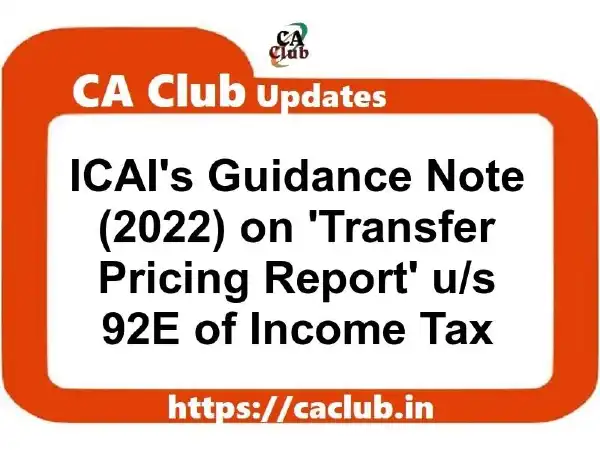The ICAI has released the Guidance Note (2022) on Transfer Pricing Reports under Section 92E of the Income-Tax Act of 1961, which integrates amendments made by the Finance Act 2022.
It should be noted that the ICAI last updated/revised this Guidance Note in 2020 in response to the revisions made by the Finance Act 2020, the issues created by the COVID-19 pandemic distorting the pattern of similar data, and so on.
From assessment year 2002-03, ALP-based income computation for international transactions between AEs applies. Section 92E of the Act requires anyone who has entered into an international or specified domestic transaction in the preceding year to acquire a report from an accountant and submit it on or before the specified date in the prescribed form.
This guidance note helps accountants meet their section 92E obligations. It intends to:
i) help understand the taxpayer enterprise’s and accountant’s responsibilities;
(ii) guide the accountant as to the nature and scope of information to be obtained from the taxpayer enterprise to enable him to conduct the examination;
(iii) provide guidance on the verification procedures to be adopted by the accountant for giving the report and the prescribed particulars in the annexure thereto; and
(iv) explain the circumstances.
ICAI’s Guidance Note (2022) on Transfer Pricing Report u/s 92E of Income Tax
After liberalizing the economy, the Government of India noted the danger of transfer pricing manipulation resulting in income shifting out of India and the inadequacy of the then-taxation legislation in dealing with that. Thus, in 2001, the Government enacted extensive transfer pricing restrictions as Chapter X of Income-tax Act, 1961 (the Act) to address such circumstances. One creative way to ensure self-compliance was to require accountant’s report in Form 3CEB as per section 92E of the Act read with Rule 10E of Income Tax Rules, 1962.
Even though taxpayers must comply with transfer pricing regulations, accountants must review papers and information and report on them. This amended Guidance Note covers critical updates on associated enterprises, international transactions, method selection, ALP computation, adjustment, and documentation.
Some emerging international transactions may not affect enterprise profit. Profit shifting must be identified and reported. Base Erosion and Profit Shifting (BEPS) Action Plans 8, 9, and 10 for intangible, Risk & Capital, and high-risk transactions highlight how transfer pricing outcomes are decided by linked parties’ actual activity in the context of contractual terms.
BEPS 2.0, the Organization for Economic Cooperation and Development’s pillar two approach to international taxation, may also affect transfer pricing notions (OECD). BEPS 2.0 pillar two aims to stop jurisdictions with lower taxes and shorter economic activities from getting tax advantages.
Taxation, especially the arm’s length principle, is threatened by digitalization. Tax administrations and consultants will have additional hurdles in ensuring regulatory compliance as business vi continues. ICAI members must remain updated. This Guidance Note may support this purpose.
